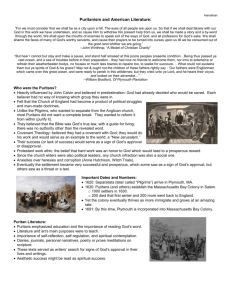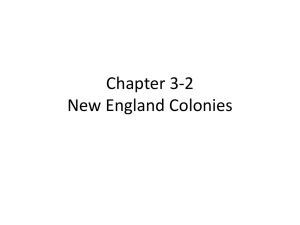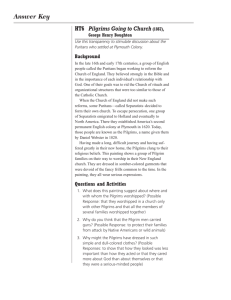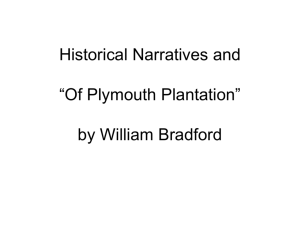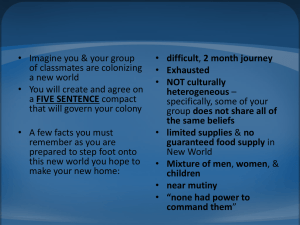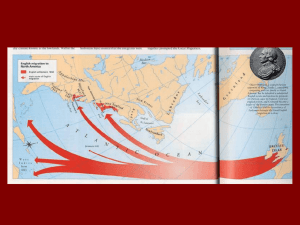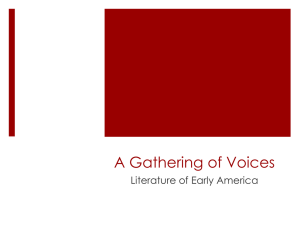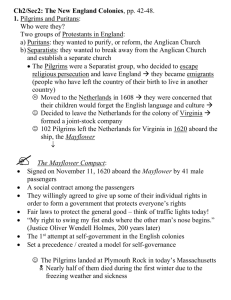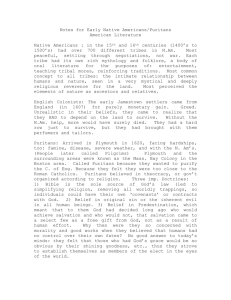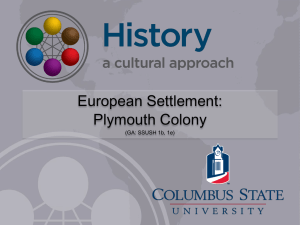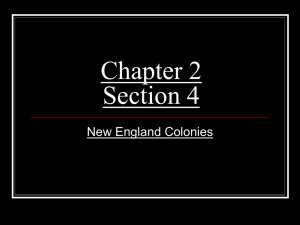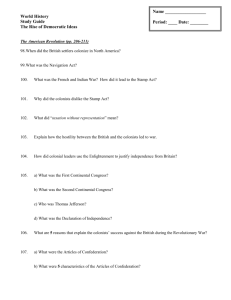Early American Literature: Beginnings to 1800 Presentation
advertisement
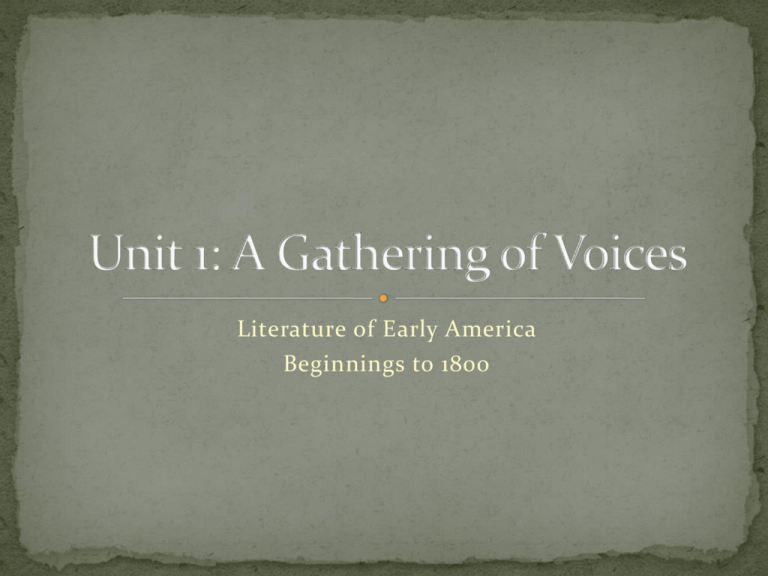
Literature of Early America Beginnings to 1800 “I come again to greet and thank the League; I come again to greet and thank the kindered; I come again to great and thank the warriors; I come again to greet and thank the women. My forefathers – what they established – My forefathers – hearken to them!” -Iroquois Hymn The First Americans As a best guess, the first Americans, Indians, arrived 12,000-70,000 years ago. The Native Americans had oral literature – myths, legends, and songs. European colonists reached America in the late 1500s. Early settlers (St. Augustine, Florida, 1565 and Jamestown, Virginia, 1607) relied heavily on lessons learned from Native Americans for survival. Puritans, Pilgrims The Mayflower reaches Plymouth, Massachusetts in 1620. Puritans, now called Pilgrims, wanted to escape the Church of England by building their own “city upon a hill.” Puritans took pride in hard work, self-discipline, and predetermination - Created theocratic societies. Puritanism slowly declined before the Great Awakening in 1720. Planters A division sets in between the northern settlements and the southern settlements. The southern colonists are called planters because of their climate, crops, social organization, and religion. The Age of Reason The Enlightenment – time period of new scientific development by philosophers in Europe The ideas of the enlightenment leads to the American Revolution. “Social Contract” forms basis of government. Push away from religion The Birth of a Nation Taxes imposed by Britain cause Americans to consider succesion. 1775 – the First Continental Congress sends “the shot heard ‘round the world.” 6 years of war followed leading to Britain surrendering at Yorktown in 1781. Constitution and Bill of Rights unites the states. What is the relationship between literature and place? What makes American literature American? How does literature shape or reflect society? What was the New World’s natural environment? Place of wonder Nature of the Americas was vastly different from anything Europeans have experienced. It was not Europe. At one with the place Native Americans thought people belonged to the land – land and water gave life. Nature was not to be feared or overcome, but honored as the source of life. What were the colonists’ attitudes toward the New World environment? Land belonged to people Dream vs. Reality Dream = Theocracy Reality = Avoid harsh death Independent Place and People “We live in an independent place, so why aren’t we an independent people?” Place taught Americans how to be Americans How did attitudes toward nature show up in literature? “Errand into the Wilderness” Religious p.o.v. – combat evil in an “uncivilized” place. Forest = wild Place and Nation “In Europe they were as many useless plants… they withered and were mowed down by want, hunger, and war; but now by the power of transplantation, like all other plants they have taken root and flourished.” – Jean de Crevecoeur What is a theme, and how does it find expression in literature? Theme – the central idea, message, or insight that a literary work reveals. What were early American themes? Wilderness Community Individualism What is uniquely American about those themes? The Place New World = Garden of Eden/Enemy The Past America did not have a history of literature like Europe did. The Vision New, new, new New kind of nation What social and political forces affected early American literature? Puritanism Self examination and spiritual insight The Enlightenment Debate and clear thinking The Declaration of Independence = rational argument for independence. Native Americans/African Americans What were the major roles of early American writers? Writer as Oral Poet and Historian Writer as Preacher and Lawmaker Writer as Autobiographer “Why should you be interested in my life? What did I learn from it? What can you learn from it?” 1492 – Columbus lands in the Bahamas 1499 – 20,000 die in London Plague 1508 – Michelangelo begins painting ceiling of Sistine Chapel 1519 – Chocolate introduced to Europe 1565 – First permanent U.S. settlement founded; St. Augustine 1588 – The Spanish Armada is defeated by England 1595 - Shakespeare completes A Midsummer Night’s Dream 1609 – Galileo builds first telescope 1620 – Pilgrims land at Plymouth 1642 – Civil War begins in England 1692 – Salem With Trials 1755 – Dictionary of the English Language 1773 – Boston Tea Party 1776 – Declaration of Independence 1789 – George Washington elected first President of the United States Part 1: Meeting of Cultures The Earth on Turtle’s Back, When Grizzlies Walked Upright, and The Navajo Origin Legend Of Plymouth Plantation (The Iroquois Constitution) Part 2: The Puritan Influence To My Dear and Loving Husband Huswifery Sinners in the Hands of an Angry God Part 3: A Nation is Born The Declaration of Independence and The American Crisis The Autobiography and Poor Richard’s Almanack (Speech in the Virginia Convention) (To His Excellency, General Washington)
